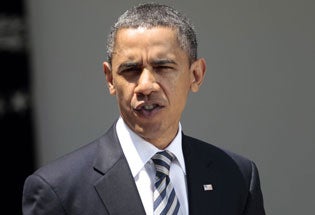Senate passes bill to prevent US default

Your support helps us to tell the story
From reproductive rights to climate change to Big Tech, The Independent is on the ground when the story is developing. Whether it's investigating the financials of Elon Musk's pro-Trump PAC or producing our latest documentary, 'The A Word', which shines a light on the American women fighting for reproductive rights, we know how important it is to parse out the facts from the messaging.
At such a critical moment in US history, we need reporters on the ground. Your donation allows us to keep sending journalists to speak to both sides of the story.
The Independent is trusted by Americans across the entire political spectrum. And unlike many other quality news outlets, we choose not to lock Americans out of our reporting and analysis with paywalls. We believe quality journalism should be available to everyone, paid for by those who can afford it.
Your support makes all the difference.The US avoided a feared and catastrophic default on the American debt, as lawmakers on today passed a measure that ties an agreement to raise the government's capacity to borrow to steep cuts in government spending.
The Senate passed the measure, a day after it passed the House of Representatives, and President Barack Obama quickly signed it into law.
The emergency bill increases the nation's $14.3 trillion cap on borrowing, thus avoiding default just hours before the midnight deadline, and begins the process of curbing the country's spiraling debt.
The administration had said the government could not pay all its bills without the new borrowing authority, and it warned that default would severely damage the global economy and push the US back into recession or worse. Even with the legislation now in place, there are fears that the last-minute sparring could shake rating agencies' confidence and harm the country's Triple-A credit rating.
Though the compromise deal passed, it deeply angered both conservative Republicans and liberal Democrats. Many Republicans contended the bill still would cut too little from federal spending; many Democrats said much too much.
A deeply frustrated Obama, while praising Congress for finally passing the compromise bill, demanded legislators immediately turn their attention to fixing the economy and creating jobs.
"We've got to do everything in our power to grow this economy and put America back to work," he said, shortly after the Senate voted 74-26 to pass the measure.
He also said he was not giving up on his insistence that Congress allow taxes to be raised on big corporations, through an end to loopholes, and the richest Americans once both houses return from their summer recess in early September. The measure that now becomes law relies wholly on cutting spending as a tool for lowering the American deficit.
"We can't balance the budget on the backs of the people who've borne the brunt of this recession," the president said.
Polls showed Americans largely supported Obama's contention that taxes need to be raised for those earning incomes above $250,000, while revoking loopholes that benefit hugely profitable oil companies and operators of hedge funds. Nevertheless, the extended and bitter fight over raising the debt ceiling, a routine matter for in past Congresses, damaged the standing of Obama and lawmakers.
A new CNN/ORC International poll found that just 14 per cent of those questioned approved of the way Congress is handling its job. Obama approval rating stood at 45 per cent.
He deeply alienated many members of his liberal base as he took increasingly centrist positions, apparently banking on picking up support from independent, middle-of-the-road voters.
After weeks of some of the nastiest political battles in recent U.S. history, both the Senate and House easily adopted the plan. In tandem, legislators approved more than $2 trillion of budget cuts over the upcoming decade.
Because the deal prescribes significant cuts to US federal spending, it was widely expected to buoy global investors and diminish chances of Treasury bonds undergoing a credit downgrade. That would increase the cost of borrowing both for the government and consumers.
But as the measure cleared its last legislative hurdle, world markets were down, the Dow Jones off for an eighth straight day.
"Neither side got all it wanted, each side laments what it didn't get," Democratic Majority Leader Senator Harry Reid said.
"Today we made sure America can pay its bills. Now it's time to make sure all Americans can pay theirs," said Reid, foreshadowing Democrats plans to shift their attention to creating jobs. US unemployment remains above 9 percent.
Investors were unnerved by spreading debt troubles in Europe and a decline in U.S. consumer spending to the lowest level in two years. The bad news signaled a further slowing of the fragile US economic recovery and snuffed out optimism over the hard-fought vote in Congress.
Polls showed that Congress and Obama have taken a sharp hit in U.S. public opinion because of the prolonged battle over lifting the debt ceiling, something that past Congresses have done as a matter of course.
Without legislation in place by the end of today, the Treasury would run out of cash needed to pay investors in Treasury bonds, recipients of Social Security pension checks, anyone relying on military veterans' benefits and businesses that do work for the government.
Treasury Secretary Timothy Geithner told ABC News Monday that he doesn't know if the bruising debt-limit battle will harm America's Triple-A credit rating, but says he fears "world confidence was damaged by this spectacle."
Geithner told ABC that credit rating is "not my judgment to make." But he also says "this is, in some ways, a judgment on the capacity of Congress to act."
AP
Join our commenting forum
Join thought-provoking conversations, follow other Independent readers and see their replies
Comments